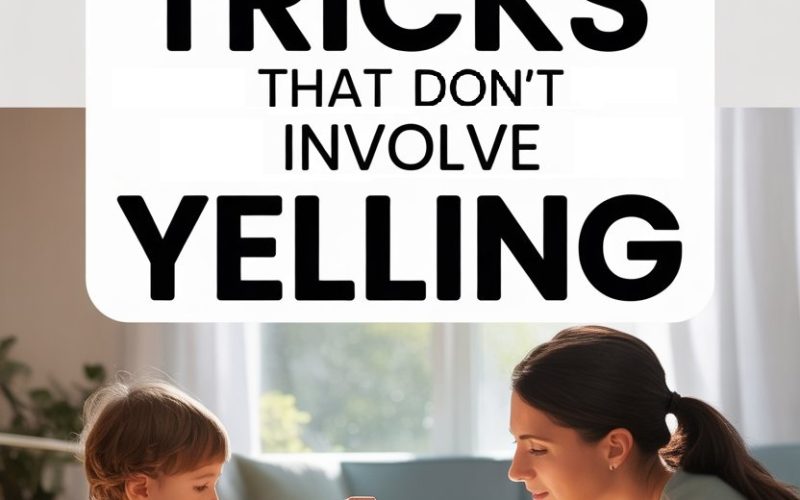Ever find yourself whisper-yelling at your child in the supermarket, hoping no one notices the vein in your forehead throbbing like a disco light? Been there.
Parenting can sometimes feel like a marathon where the finish line keeps moving, and the crowd is made up of tiny, sticky fans who want another snack.
The good news: you don’t have to raise your voice (or your blood pressure) to steer your kids in the right direction.
Yelling might feel like the only option in the heat of the moment, but there are gentler, more effective ways to teach your kids boundaries—even when you’re running on three hours of sleep and a questionable amount of coffee.
Let’s get into five discipline tricks that’ll help you keep your cool, your authority, and maybe even your sense of humour.
1. The Magic of Whispering
It sounds counterintuitive, doesn’t it?
When chaos is peaking, the instinct to crank up the volume is strong. But turning the dial way down can actually grab your child’s attention better than a shout ever could.
Kids are hardwired to tune out noise when it gets overwhelming (just ask any teacher), but a sudden whisper? That’s intriguing. It interrupts the pattern.
Drop down to their level, look them in the eye and say, in your best conspiratorial voice, “Can you help me with something?” Or even, “I need your help figuring this out.” This simple switch often stops wild behaviour in its tracks.
Whispering has another benefit too: it models calm under pressure, showing kids that big feelings don’t always have to mean big volume.
Researchers have found that children mirror the emotional intensity of their caregivers. Quiet confidence from you helps grow that same self-control in them.
2. Give Choices, Not Ultimatums
“Eat your peas or else!” (Cue dramatic dinner table standoff.) Ultimatums can feel logical in the moment, but they rarely end with anyone feeling like a winner.
Offering a choice puts kids back in the driver’s seat—within the boundaries you set.
Try this: “Would you like to put on your pyjamas first, or brush your teeth first?” Both options lead to the same destination (bedtime), but your child gets a say in the route.
When kids feel some control, they’re more likely to cooperate.
This approach is backed up by child development experts, including those at Harvard’s Center on the Developing Child. Decision-making, even in small doses, builds executive function skills.
And honestly, if offering the blue cup instead of the red one means fewer tears, that’s a win.
3. Use Natural Consequences
Tired of repeating yourself about shoes, jackets, and the importance of not smearing peanut butter on the cat? Sometimes, experience is the best teacher (within reason—please, no hypothermia for the sake of a life lesson).
Natural consequences happen without you having to invent a punishment. If your child refuses to wear a coat, they might feel chilly outside—and learn to grab it next time. If they leave toys in the rain, those toys might not survive.
This method takes a little patience—and a little faith—but it works wonders for helping kids connect the dots between actions and outcomes.
Natural consequences also foster independence and problem-solving skills. The American Academy of Pediatrics suggests that letting children face the results of their choices can be far more effective than time-outs or lectures.
The trick is making sure the consequence is safe and reasonable, and not stepping in to rescue too quickly (unless we’re talking actual danger or irretrievable stuffed animals—there’s a line).
4. The Praise Sandwich
Catch them being good. No, really—catch them. Positive reinforcement isn’t just a shiny sticker on a behaviour chart; it’s a powerful motivator.
The praise sandwich method works like this: start with a positive comment, gently mention the behaviour that needs tweaking, and end with encouragement.
Example: “You did such a great job putting your shoes away. Next time, could you remember to hang up your backpack too? That would make things even tidier. I love how you’re helping around the house!”
See? No yelling. No one’s ego gets bruised. You’re just highlighting the good, nudging towards better, and closing with some love.
Consistent, specific praise has been shown to increase positive behaviour in children, according to research from the CDC. And let’s be honest, everyone likes their efforts noticed—even if they’re currently covered in jam.
5. The Strategic Pause
Ever tried to negotiate with a toddler when you’re both running late? It’s like reasoning with a tiny, emotional lawyer who’s missed their nap. Sometimes, the best move is to do nothing—at least, not immediately.
Pausing before you respond—whether it’s to a tantrum, a snarky comment, or a sibling squabble—gives you a moment to collect your thoughts.
Take a deep breath, count to ten, or silently recite your mantra (“This too shall pass…”) before you say anything. The pause isn’t about ignoring the problem, but about resetting the emotional thermostat.
Your calm response (or at least your best attempt at one) demonstrates emotional regulation. According to clinical psychologist Dr. Laura Markham, kids learn by example.
When you show them how to take a step back instead of exploding, they’re more likely to use that tool themselves—eventually. Rome wasn’t built in a day, and neither was your three-year-old’s self-control.
When All Else Fails, Chocolate Helps
No parenting strategy is foolproof. Some days, the only thing standing between you and a complete meltdown is the promise of a square of chocolate (for you, not the kids).
The important thing is that you’re trying—and that your child feels loved, even during the trickiest moments.
Gentle discipline isn’t about never making mistakes. It’s about modelling resilience, kindness, and the ability to start fresh, even when the last fifteen minutes have been chaos.
Next time you’re tempted to shout, try one of these tricks instead. Your vocal cords—and your neighbours—will thank you.
And if all else fails? Well, there’s always tomorrow (and a fresh mug of coffee).




